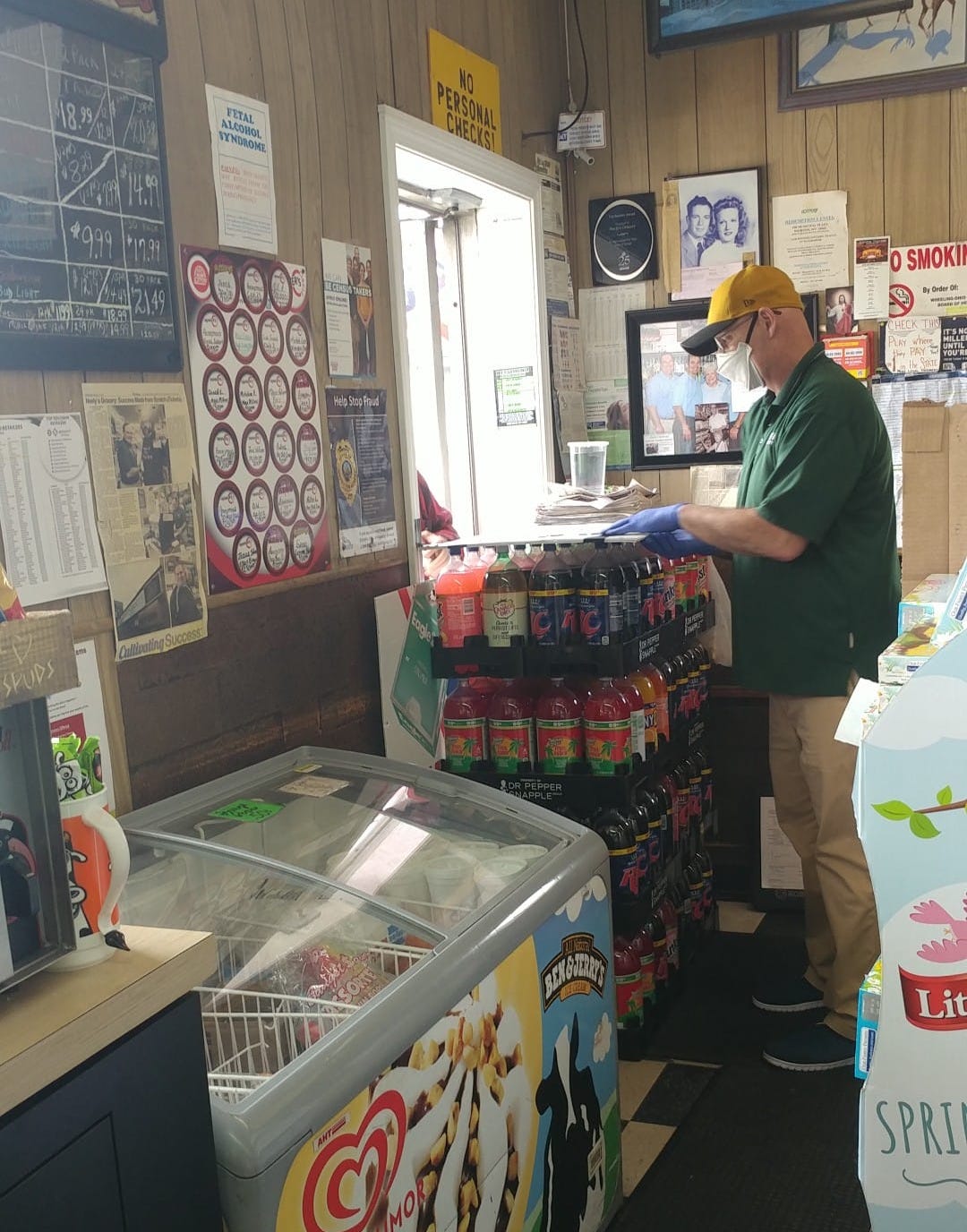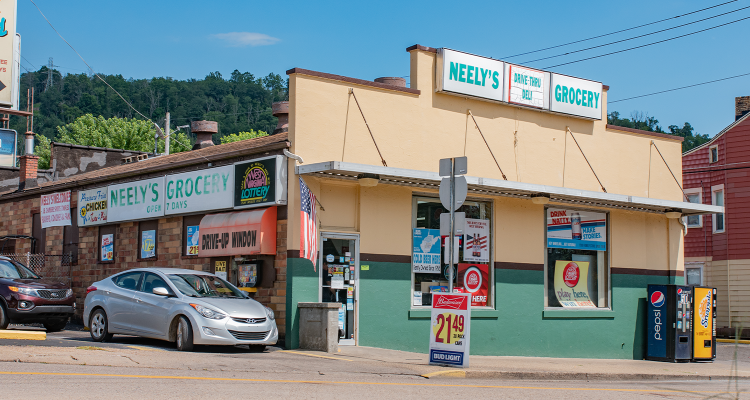Does a hairstylist working on her own qualify for a new round of federal assistance to small businesses? Can a corner store get reimbursed for more than $3,000 spent on plexiglass shields, disposable gloves and masks needed to cope with COVID-19?
Wheeling development official Nancy Prager knows. (The short answers are “maybe” and “yes.”)
But, because reaching the full answers may take some research, she is hoping business owners who are interested in tapping into the West Virginia CARES Act grants will contact her. (Contact and program details are at the bottom of this post.) This is her hope even if they feel comfortable navigating what she said is an “unusually user-friendly” application site on their own.
“So far, I’ve had a small grocery contact me, two different beauty shops, a small retail store,” said Prager, director of the city’s Economic and Community Development Department. “It’s good for me to hear how businesses are doing. I need to know what they need.”
She noted that even businesses that do not qualify or have needs that are beyond the $5,000 limit for the WV CARES grants may be able to get help from her office in other ways. It’s a critical time, Prager said. The city wants to do everything it can to help them all survive.
“(Small businesses) are the lifeblood of the city,” she added. “Their tax money stays in the city. They hire local people. They purchase from local vendors.”
For example, she said an independent restaurant operating in the city is purchasing food locally and having their menus printed at a local print shop rather than having supplies arrive via semi-truck. She said this intense localization is an important part of a web of local employment — which also includes big-box stores and other chains.
Even the limited contact she has had so far with applicants to the grant program — which is open until Sept. 30 — has revealed that small businesses are still in need. “Most of the businesses that have applied have well in excess of $5,000 in lost revenue,” she said of the current granting program’s cap.
The lack of social gatherings, stores that were shuttered for weeks on end and a sudden need for odd supplies such as disposable gloves and plexiglass can really add up quickly. Businesses have to be able to reopen in way in which they can still make money, she said.
She is hopeful, based on what she has seen so far, that they can and will — especially with such assists as the CARES grants.
“We have really creative businesses that are just doing whatever they need to do to stay afloat,” Prager said of some 1,200 businesses — small and large — operating in the city. “I have not heard of any businesses closing and some have actually opened. Elm Grove Sub Shop is one of those.”
ON THE FRONT LINES
Two small business owners said they are certainly glad to get both financial relief and the expertise needed to access it whenever they can.
“It’s starting to look like things are normal to people,” said Carrie Eller, owner of Under the Elder Tree Apothecary and Healing Arts Centre. “It’s not. … We’re still struggling.”
Eller, whose small business did not qualify for an earlier round of federal payroll assistance because her three employees were part-time, said she is skittish about making a legal misstep as she navigates the bumpy COVID road.
“(The payroll assistance) would have been a loan for me instead of a grant because I didn’t have full-time workers,” Eller said of why she is watching granting programs carefully. “I couldn’t afford to take on another loan.”

That federal-assistance avenue closed, Eller has kept her 6-year-old business afloat by laying off everyone, including, to a certain extent, herself. Any revenue from curbside sales during the quarantine or store/service sales in more recent weeks has been going into paying necessities such as taxes, utilities and mortgage payments.
It hasn’t been quite enough. In July, Eller took to Facebook and GoFundMe to pay the property taxes on her building in downtown’s Centre Market historic district.
“I was shocked,” Eller said of the direct community response. “Within 24 hours, I’d met the goal. … It was humbling how many people chipped in.” Donations ranged from $1 to $500, she noted.
Eller hopes to apply for a WV CARES grant, more on the lost revenue end than new expense side of eligibility as she realizes the path ahead is still a long, uncertain one.
“‘Stable’ is a pretty strong word,” she said of assessing her current business situation. One part-time massage therapist will be back as of August. The store is open two days a week, and she is booking spa services other days of the week. “It’s like a day-to-day, week-to-week type of thing. People are scared to be touched.”
ESSENTIAL & OPEN
Neely’s Grocery of East Wheeling is also excited about the WV CARES Grant. “I’ve already applied,” said Scott Miller, vice president of the 65-year-old store. Wheeling’s Prager assisted with his application, he noted.
“We’re one of the few ma’s and pa’s still left,” said Miller. He and three brothers —Lance, Todd and Rod — are nephews of the original operators. The store employs another nine individuals, as well.
Miller said it has been a new experience for the store to seek government assistance — Neely’s Grocery qualified for the earlier round of payroll assistance — but they are glad to have access to help given the unprecedented challenges of COVID-19.
The store remained open during quarantine as an essential business. A drive-thru window installed prior to the pandemic allowed workers to assemble called-in orders. Miller, in his 60s, said he clocked more than 22,000 steps one day doing such stuff during that time period.
That stage is over, but, there’s open and there’s COVID open.

Lottery ticket sales are down, including those anticipated to have been sold during the canceled Italian festival, Miller said. He noted Neely’s Grocery normally nets about $5,000 in lottery revenue from that event alone. Elsewhere in the revenue stream, he said some items are up (groceries that are covered by enhanced food-assistance programs; alcohol) and others are way down to gone (such as fried chicken destined for graduation parties).
And while revenue has dropped, expenses have gone up, Miller added. He said the business has spent more than $3,000 to date on disposable gloves, masks and hand sanitizer. Another $400 has gone for plexiglass shields.
“We’ve got a fortress going on in here,” he joked of the required sanitation measures.
And ironically, COVID prompted the business to add a person to the payroll. A recently hired custodian now comes in for a nightly, storewide cleansing.
Programs like the tax-funded WV CARES grant are a part of what’s making his business work right now, he said. But, so is really hard work. “The public’s been good to us and we’ve been good to the public.”
Eller of Under the Elder Tree understands this thinking. Various grant programs may come and go as COVID-19 continues to unfold. “I’m working double the time for half of the revenue,” she said of reality of 2020. “It’s up to me to save my own business.”
DETAILS, DETAILS
WV CARES (Coronavirus Aid, Relief and Economic Security) Act is part of a $1.25 billion appropriation from the federal government to the state. Earlier elements of the mammoth federal aid package have already reached West Virginia in the form of a round of payroll assistance to qualifying businesses and organizations and as stimulus checks sent directly to citizens.
This new round of small business grants can provide up to $5,000 to cover the costs of business interruption, lost sales and other expenses resulting from the COVID-19 pandemic.
Applications for the grants and details on qualification are available online. Those interested in assistance or additional information should contact Wheeling development official Nancy Prager at 304-234-3701 or via email.
The application process, which opened July 13, will close on Sept. 30.
General guidelines limit eligibility to businesses that:
• have between 1 and 35 full-time employees that were registered as “employees” with WorkForce West Virginia as of March 2020; (Prager notes this guideline would eliminate some solo-run businesses, but not others. She can explain the difference to potential applicants.)
• have their principle place of business in West Virginia;
• were qualified to do business in West Virginia and in operation as of February 29, 2020;
• are currently and intend to remain qualified to do business in West Virginia and in operation for at least the next 12 months;
• are in good standing with the state Tax Department and WorkForce West Virginia;
• are a for-profit business;
• are not in violation of any state order or decree (such as mine safety, state Department of Environmental Protection citations, etc.);
• are not presently suspended, debarred, proposed for debarment, declared ineligible or otherwise excluded from participation in any federal grant program, and are not presently a debtor in any pending bankruptcy (including any owners of the business);
• have suffered eligible expenses and/or losses because of the COVID-19 pandemic.
Prager noted that businesses must also be registered as a “vendor” through the wvOASIS system to start the application process. The $125 fee normally required to register is being waived during the granting process.
Eligible COVID-19 expenses and losses are broad. A complete list is available on the grant website, but here are some examples of what may be eligible.
• rent, mortgage and utility payments
• payroll.
• the purchase of plexiglass shields and personal protective equipment required to do business.
• the cost of replenishing inventory for a re-opening.
• COVID-related remodeling, such as the installation of a drive-thru or outdoor seating, the switch to smooth-surface furniture and flooring for better sanitizing ability or the installation of contact-free doors.
• website design or reconfiguration.
• A long-time journalist, Nora Edinger also blogs at noraedinger.com and Facebook and writes books. Her Christian chick lit and faith-related non-fiction are available on Amazon. She lives in Wheeling, where she is part of a three-generation, two-species household.


